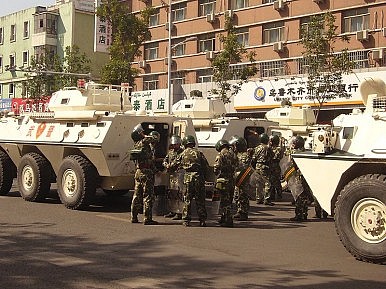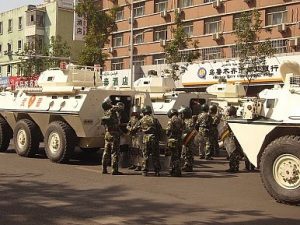Remembering the Ghulja Incident: 20th Anniversary of ‘Uyghur Tiananmen’ Passes With Little Notice

The Diplomat, 1 March 2017

By Peter Irwin — February 5, 1997, remains one of the most unforgettable days of commemoration for the Uyghur people. This year, the 20th anniversary of violently suppressed demonstrations in Ghulja, Xinjiang, reminds us of the raw and unimaginable power of the Chinese government.
The anniversary also happened to slip by with nearly no mention outside some circles. If Tiananmen Square stands as a persistent symbol of the stifling of Chinese collective action in Beijing, the Ghulja Incident holds a similar position in the consciousness of Uyghurs.
Understanding the Tiananmen Square protests in 1989 is nearly impossible without understanding China’s drastic market reforms through the 1980s. In the same way, recognizing the burgeoning Uyghur youth cultural movement in Xinjiang (also called East Turkestan by many Uyghur exiles) is likewise essential in understanding the roots of Ghulja.
The late 1980s and early 1990s saw Uyghur youth across the province embrace Meshrep – a traditional form of cultural entertainment for Uyghurs – as a form of collective cultural expression. Meshrep typically consists of social and cultural activities such as music, dance, the recitation of poetry, or simple conversation, as well as organized sports, primarily among young men.
These activities gained steam in the late 1980s with wide support from the public as well as support from the state, who initially saw these activities as a positive influence, as it acted as a remedy to a period of high unemployment, as well as alcohol and drug abuse that had plagued some Uyghur communities.
Authorities quickly began to change their tune towards the mid-1990s as the influence of the gatherings began to be seen as a potential threat to the Communist Party. Meshrep leaders began to be called to public security bureau meetings and many of their events and activities were increasingly ordered cancelled.
Most notably, Abduhelil Abdurahman – a prominent Meshrep leader from Ghulja – was arbitrarily arrested in April 1996 at the outset of China’s second “Strike Hard” campaign in the region. Abduhelil was beaten and tortured while he was held without charge in prison. He was eventually killed while in detention and his family was prohibited from seeing the body – a pattern repeated on a number of occasions years later with victims’ families.
The Strike Hard campaign ran throughout the year with countless arrests and continued crackdowns on Uyghur cultural and religious expression as well as targeting “splittism” and “separatism.” As expected, the practice of Meshrep stood as a primary target in the assault.
By the beginning of 1997, after thousands had been arrested and many others closely monitored, tensions had built to a fever pitch across the province. The spark that lit the powder keg occurred when a group of women who had gathered at a home for prayer on the night of February 3 were surrounded by armed police and subsequently arrested.
Family and friends then gathered at the public security bureau and demanded the release of the women, but were quickly rebuffed. By February 5, protests had swelled to hundreds in different locations around the city as many young Uyghur men organized not only in defense of the detained women, but as a reaction to the slowly building restrictions, seen as a clear attempt by the state to dilute Uyghur culture.
The demonstrations were immediately quashed by Chinese security forces, leaving at least dozens dead and many more injured. Thousands of arrests were made in the subsequent weeks. Others, who were hosed down in the streets with icy water, suffered severe frostbite on account of frigid Ghulja temperatures in early February and some allegedly had to have feet, fingers, or hands amputated. In addition, of those arrested, more than 200 would face the death penalty.
Despite such a severe reaction from the Chinese government, the Ghulja demonstrations and the aftermath were met with scant media coverage, largely on account of incredibly tight restrictions on foreign reporting. As a direct result, to much of the international community, Ghulja will never hold the same resonance as Tiananmen.
To this day, demonstrations of any kind are effectively unlawful, just as any public (or even private) opposition to the state can land you in prison.
Simple freedom of expression is now non-existent. Ilham Tohti, the most prominent Uyghur voice in China, was arrested and sentenced to life in prison for gently criticizing state policy toward Uyghurs. Uyghur poets, bloggers, writers, and web administrators have all been silenced in recent years.
Independent media is effectively barred from operating in the region, compounding the opacity of daily events and struggles there. The Committee to Protect Journalists (CPJ) found that in 2014, 17 of the 44 journalists detained in China were of Uyghur origin.
In terms of culture, China did successfully submit Uyghur Meshrep to UNESCO’s list of Intangible Cultural Heritage in Need of Urgent Safeguarding, but now retains more control over the practice since it resurfaced in the 1980s, effectively limiting its influence and ties to religious expression.
All told, it’s difficult to think of another place in the world where cultural and religious freedom has been so stifled as in Xinjiang. Each month, new reports reveal the adoption of stricter controls, from prohibiting parents from engaging in religious practices with their children, to ordinary Uyghurs being arrested for organizing prayer meetings, to the outright demolition of mosques under the guise of public safety.
As it stands today, the only venue where religious practice is legally accepted is within state-sanctioned mosques, and then only for those over the age of 18.
In terms of security, China passed its Anti-Terror Law in December 2015, which was widely condemned by the international community for its incredibly broad and vague language. During a counterterror operation in September 2015, it was reported that 11 of the 28 people killed by police and security forces in the raid were women and children. Such major incidents, along with even the most trivial cases, are carefully filtered through state-controlled media and emerge within a particular and predictable framework.
Freedom of movement has also been heavily restricted, as we saw firsthand with China’s confiscation of passports from all of its residents in the province late last year. Those wishing to leave the country would have to apply for approval from their local government offices.
The recent introduction of “police convenience stations” as well as additions to the already extensive network surveillance infrastructure continues to restrict and regulate movement and behavior. The new architecture, which some call “grid-style social management,” has been a clear hallmark of the province’s new party secretary, Chen Quanguo, who held that role for five years in Tibet and now will look to make his mark in Xinjiang.
China outwardly strives for “stability maintenance” across the country and is nervous about the threat of solidarity not based around ostensibly communist ideals. Solidarity not centered around the state may present obstacles to Xi Jinping’s ambitious “One Belt, One Road” economic project that looks to revive trade routes to the south and west with Xinjiang at its fulcrum.
The intention here is not to rehash old problems or to lay out each and every issue faced by the Uyghur community in order to play the victim, but to expose China’s thinking on issues of difference in an effort to illustrate the counter-productivity that lies at the very heart of this policy.
Difference is not a threat, but on the contrary can act as a beneficial and remedial force, not only to strengthen the Uyghur population but to promote the very stability so desired by those in Beijing.
Peter Irwin is an MSc Human Rights graduate from the London School of Economics and Political Science (LSE) and currently works in Munich, Germany as Project Manager at the World Uyghur Congress, an international human rights advocacy organization representing the collective interests of the Uyghur Muslim minority in China.
Remembering the Ghulja Incident: 20th Anniversary of ‘Uyghur Tiananmen’ Passes With Little Notice

